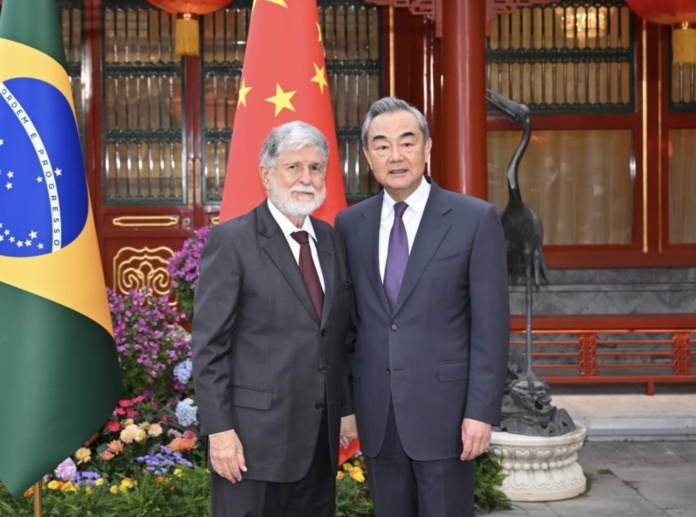A recent proposal prepared by China and Brazil on the settlement of the Ukrainian crisis can be regarded as a positive step forward in the diplomacy of conflict resolution; nevertheless, due to the fact that Ukraine has perceived China as more pro-Russian than politically neutral, there remain some challenges to achieving a breakthrough in the well-intentioned Sino-Brazilian proposal.

On May 23, 2024, the Chinese Foreign Minister Wang Yi met with Celso Amorim, the Chief Advisor to the Brazilian President, in Beijing. The two sides had in-depth discussions on how to resolve the Ukrainian crisis, and they produced a six-point proposal.
First, the two sides call on all the related parties to observe three principles of deescalating the situation, namely no expansion of the battlefield, no escalation of fighting, and no provocation by any party.
Second, the two sides believe that dialogue and negotiation are the only viable solution to the Ukrainian crisis. All parties should create the conditions for the resumption of direct dialogue and push for the de-escalation of the situation until a comprehensive ceasefire is achieved. China and Brazil support an international peace conference held at a proper time when it is recognised by both Russia and Ukraine, with the equal participation of all parties and the discussion of all the peace plans concerned.
Third, efforts are necessary to increase humanitarian assistance to relevant regions and to prevent a humanitarian crisis on a large scale. Attacks on civilians or civilian facilities must be avoided, while civilians, including women and children, as well as prisoners of war, must be protected. The two sides support the exchange of prisoners of war between the parties concerned in the conflict.
Fourth, the use of weapons of mass destruction, especially nuclear weapons, and chemical and biological weapons, must be opposed. All efforts must be made to prevent nuclear proliferation and to avoid a nuclear crisis.
Fifth, any attacks on nuclear power plants and other peaceful nuclear facilities must be opposed. All parties should comply with international law, including the Convention on Nuclear Safety, and they should resolutely prevent any human-caused nuclear accidents.
Sixth, dividing the world into isolated political or economic groups should be opposed. The two sides call for efforts of enhancing international cooperation in energy, currency, finance, trade, food security, and the security of critical infrastructure, including oil and gas pipelines, undersea optical cables, electricity and energy facilities, and fibre-optic networks, to protect the stability of global industrial and supply chains.
Finally, China and Brazil welcome members of the international community to support and endorse the previously mentioned common understandings and to jointly play a constructive role in de-escalating the situation and promoting peace discussions.
The proposal reached between China and Brazil is well-intentioned and should be commended as an incredibly positive step towards the resolution of the Ukrainian conflicts. Within a week, 45 countries responded positively to the six common understandings.
However, from the perspective of realpolitik, there remain some challenges ahead so that the proposal would be perfected for the sake of galvanising the support of more countries and achieving a genuine diplomatic breakthrough.
First and foremost, Ukraine has recently perceived China as diplomatically “unsupportive” amid the criticism levelled by Ukrainian President Volodymyr Zelenskyy that China has been “working hard” to prevent some countries from participating in a peace summit in Switzerland next month. The Chinese side denied this, but certainly Ukraine’s perception of China remains an obstacle to any breakthrough in the Sino-Brazilian proposal for peace. The Chinese Foreign Ministry spokesperson, Mao Ning, said even if China does not attend the Switzerland peace summit, it does not mean that Beijing does not support peace. Moreover, China insists that an international peace conference should be endorsed by both Russia and Ukraine, with the equal participation of all parties, so that the peace proposal would be discussed in a fair and equal manner. In short, China believes that the conditions for a peace summit have not been met.
It is reported that 80 countries have confirmed their attendance at the Switzerland summit.
Second, Ukraine has perceived China as politically pro-Russian, a perception exacerbated by the criticism made by the US that China has appeared to provide equipment and logistical support for the Russian military. The Chinese side denied such an act.
It is reported that China has been supplying Russia with dual-use goods with civilian and military applications. These goods include machine tools, microelectronics, and optical parts of military weapons like tanks, armoured vehicles, drones, cruise missiles, and other equipment. The Chinese side refuted the criticism from the US and some European countries, saying that its trade with Russia is legitimate.
In response to a reporter’s question that China has been exporting dual-use materials, such as nitrocellulose, to help the Russian production of ammunition and rocket propellants, Foreign Ministry spokesperson Wang Wenbin on May 16, 2024, said: “China always handles the export of military products in a prudent and responsible way, and strictly controls the export of dual-use articles, including drones for civilian use. The US makes false accusations against China’s normal trade with Russia, just as it continues to pour unprecedented military aid into Ukraine. This is typically double-standard.”
Third, the rivalries between Ukraine and Russia have directly affected how both sides may see the Sino-Brazilian proposal. As mentioned before, Ukraine sees China as being “pro-Russian.” Russia has perceived the Switzerland summit as a platform for Ukraine to galvanise a group of countries to support the Ukrainian demand for a total Russian withdrawal from Ukraine. Russian President Vladimir Putin has expressed his backing for China to initiate a peaceful settlement of the Ukrainian crisis.
As such, the politics of distrust remain an obstacle to any proposal made by any group of countries, including the six-point proposal from China and Brazil, to resolve the Ukrainian crisis.
While Switzerland is perceived as pro-western in its forthcoming summit, the Sino-Brazilian proposal is perceived as relatively pro-Russian. As such, neither side can break the diplomatic deadlock.
Fourth, Ukraine is eager to witness a proposal that can deal with territorial disputes right away, but the Sino-Brazilian proposal appears to be one that lays out the preconditions for a next-stage negotiation over territorial issues.
In May 2023, when the Chinese peace envoy Li Hui visited Ukraine and Europe, he was reportedly promoting a ceasefire that would leave Russia occupying parts of Ukraine – a move unacceptable to Ukraine.
The current six-point proposal initiated by China and Brazil also avoids the discussion of territorial issues. As such, unless Ukraine changes its position and becomes more patient in the process of trust-building that would lead to detailed negotiations, the Sino-Brazilian proposal may need more fine-tuning to make it acceptable to Ukraine.
Fifth, the sixth point in the Sino-Brazilian proposal, namely the call for a world divided into isolated political or economic groups, appears to be an implicit criticism of the western bloc, although the call for international cooperation on energy supply and other economic areas is a positive step that should be commended. If so, the sixth point in the proposal may arouse some distrust from some western countries rather than soliciting their immediate political support of the proposal. It may have to be rephrased in an even more cautious tone to seek the wider support of the western countries.
The six-point proposal from China and Brazil is more focused and much narrower than the 12-point position of China on the political settlement of the Ukrainian crisis in February 2023. At that time, the 12 points include (1) respecting the sovereignty of all countries; (2) abandoning the Cold War mentality; (3) ceasing hostilities; (4) resuming peace talks; (5) resolving the humanitarian crisis; (6) protecting civilians and prisoners of war; (7) keeping nuclear power plants safe; (8) reducing strategic risks; (9) facilitating grain exports; (10) stopping unilateral sanctions; (11) keeping industrial and supply chains stable; and (12) promoting post-conflict reconstruction. The Sino-Brazilian six-point proposal tends to extract the elements of points (3), (5), (6), (7) and (8) from the earlier 12-point position adopted by China.
In conclusion, the six-point proposal initiated by China and Brazil is a positive and commendable step forward in the exceedingly difficult path of resolving the Ukrainian conflict. Nevertheless, due to Ukraine’s perceptions of China, the distrust between Ukraine and Russia, the eagerness of Ukraine to witness a proposal that tackles territorial issues the right way, and the sensitivity of the western economic bloc versus Russia, the six-point proposal initiated by China and Brazil with the good intention and laudable motivation of achieving peace is going to encounter some challenges, which call for more efforts and more thoughts in refining its content further. Every dark cloud has a silver lining; countries in the world are still hoping for the best and working diligently in the endless quest for a peaceful solution in the Ukrainian crisis.
*Sonny Shiu-Hing Lo is a political scientist, veteran commentator, and author of dozens of books and academic articles on Hong Kong, Macau, and Greater China




















